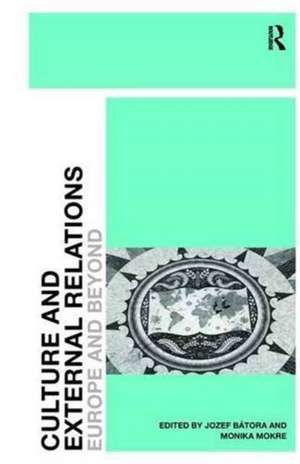Culture and External Relations: Europe and Beyond
Autor Jozef Bátora, Monika Mokreen Limba Engleză Paperback – 17 noi 2016
| Toate formatele și edițiile | Preț | Express |
|---|---|---|
| Paperback (1) | 338.33 lei 6-8 săpt. | |
| Taylor & Francis – 17 noi 2016 | 338.33 lei 6-8 săpt. | |
| Hardback (1) | 821.82 lei 6-8 săpt. | |
| Taylor & Francis – 15 iun 2011 | 821.82 lei 6-8 săpt. |
Preț: 338.33 lei
Preț vechi: 386.78 lei
-13% Nou
Puncte Express: 507
Preț estimativ în valută:
64.75€ • 67.35$ • 53.45£
64.75€ • 67.35$ • 53.45£
Carte tipărită la comandă
Livrare economică 12-26 aprilie
Preluare comenzi: 021 569.72.76
Specificații
ISBN-13: 9781138279599
ISBN-10: 1138279595
Pagini: 216
Dimensiuni: 156 x 234 mm
Greutate: 0.45 kg
Ediția:1
Editura: Taylor & Francis
Colecția Routledge
Locul publicării:Oxford, United Kingdom
ISBN-10: 1138279595
Pagini: 216
Dimensiuni: 156 x 234 mm
Greutate: 0.45 kg
Ediția:1
Editura: Taylor & Francis
Colecția Routledge
Locul publicării:Oxford, United Kingdom
Notă biografică
Jozef Bátora is associate professor and director at the Institute of European Studies and International Relations, Comenius University in Bratislava, Slovakia. Monika Mokre is senior research fellow at the Institute for Cultural Studies and History of Theatre, Austrian Academy of Sciences in Vienna, Austria.
Recenzii
'So far, students of culture in international politics have mostly focused on how culture raises boundaries and how cultural differences bring about conflicts. This volume provides a more balanced perspective. While acknowledging its boundary-raising function the authors also examine how culture builds bridges among peoples. This insight makes an important contribution to the debate.' Petr Drulák, Institute of International Relations, Czech Republic 'At a time when practitioners and academics alike seek answers to the question of how "culture" works, or could be put to work, in the politics of the EU, this book revisits the question itself in a more vigorous and critical manner. The outcome is an exciting contribution to a whole range of contemporary theorising: from European Studies to the "aesthetic turn" in International Relations theory.' Alexander Astrov, Central European University, Hungary 'Off the beaten path, this refreshing set of essays makes a strong case for the study of culture, as a broad concept, in European and EU international relations. The book helps to widen the horizon of students of international relations and Europe's role in it, which makes it a most welcome contribution.' Jan Melissen, Netherlands Institute of International Relations Clingendael and Antwerp University, and Co-Editor of The Hague Journal of Diplomacy
Cuprins
Introduction: What Role for Culture in External Relations?, Jozef Bátora, Monika Mokre; Part I Universalism Versus Part icularism; Chapter 1 Free Trade by Force: Civilization against Culture in the Great China Debate of 1857, Erik Ringmar; Chapter 2 Our Culture and all the Others: Intercultural and International Relations, Iver B. Neumann; Chapter 3 The Logics of Culture in the Anglosphere, Srdjan Vu?eti?; Part II Boundary Building Versus Boundary Transcendence; Chapter 4 Culture and Collective Identifications, Monika Mokre; Chapter 5 Exclusion and Transversalism: Culture in the EU’s External Relations, Jozef Bátora; Chapter 6 ‘Culture’ in EU–Turkey Relations, Bahar Rumelili, Didem Cakmakli; Part III Policy Aspects; Chapter 7 Abstract Expressionism as a Weapon of the Cold War, Manfred J. Holler, Barbara Klose Ullmann; Chapter 8 Between a Rock and a Hard Place: Cultural Policies of and towards Serbia, Dragi?evi? Milena Šeši?; Chapter 9 European Coordination of External Cultural Policies, Emil Brix; conclu Conclusions, Monika Mokre, Jozef Bátora;
Descriere
While the importance of culture has been on the rise in the realm of foreign affairs, its role in this field remains one of the most under-studied aspects of state policy. In this book, a range of international experts take an unprecedented look at the role culture plays in the European Union's foreign affairs.















